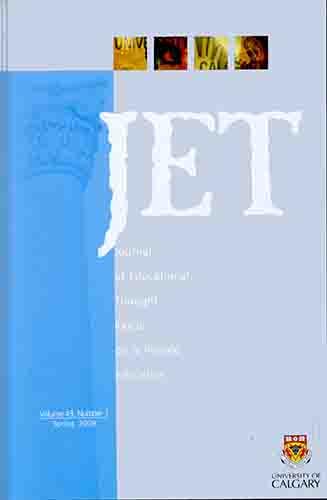Knowing Differently Situated Others: Teachers and Arrogant Perception
DOI:
https://doi.org/10.55016/ojs/jet.v43i1.52392Abstract
In the context of teacher education, where practicality is the chief area of concern for teacher candidates, philosophical analyses of oppression must be perceived to contribute to the pressing concerns of teaching workloads and classroom management as well as justice. This paper proposes to make a link between teaching work and considerations of diversity that emerge as teachers "consider the standpoint of the other" (see Young, 1997, p. 22). Arguing with Iris Marion Young that it is neither possible nor ethically satisfactory to "take the other's point of view" per se, the paper provides an account of what is involved in considering the standpoint of differently situated others. The argument here, however, is epistemological rather than ethical. Specifically? - the paper addresses questions that arise as teachers occupy subject positions of relative privilege either within the society at large or as a function of the normalizing processes of schools. Young's analysis of asymmetric reciprocity is juxtaposed with Maria Lugones' analysis of arrogant and loving perception, "worlds" and "world traveling" (1990). The analysis offers teachers a means of rereading their participation in school purposes and their reception of student performances as resistance. The paper proceeds in four sections: the first reports briefly on Young's advocacy of asymmetrical reciprocity, and emphasizes a fragile understanding open to wonder and surprise rather than recognition. The second presents a reading of Lugones' and Frye's conceptions of arrogant perception and world-traveling that pays particularly close attention to Lugones' account of what it means to be at ease in a world. The third section of the paper moves to the level of institutional analysis. The object of study is that body of schooling practices that might be read as positioning teachers in subject positions of institutional arrogant perception. The fourth section addresses three practical ways in which teachers might address notions of arrogant and loving perception: deconstructing their institutional and social locations, using their own world-traveling to proliferate non-dominant curricular and classroom practices, and reorienting themselves with respect to students' resistance.
Downloads
Published
Issue
Section
License
The Journal of Educational Thought retains first publication rights for all articles. The Journal grants reproduction rights for noncommercial educational purposes with the provision that full acknowledgement of the work’s source be noted on each copy. The Journal will redirect to the appropriate authors any inquiries for further commercial publication of individual articles. All authors wishing to publish in JET will be asked to fill in and sign a Consent to Publish and Transfer of Copyright agreement.
Authors must affirm that any submission to JET has not been and will not be published or submitted elsewhere while under considration by JET.

